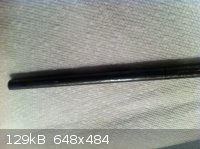| Pages:
1
2 |
dann2
International Hazard
    
Posts: 1523
Registered: 31-1-2007
Member Is Offline
Mood: No Mood
|
|
Hello,
The Magnetite anode is not corroding at all as far as I can see. They are quite a good Chlorate maker anode but you must have pH controll as far as I
can tell.
See the 'More on LD anodes' thread for the ATO/LD anode story so far.
It has make approx. 1.5 KG Na Perchlorate (from Chloride). I have it in a pure Perchlorate cell from today. A total of 0.3mm has wore off its surface.
Dann2
|
|
|
dann2
International Hazard
    
Posts: 1523
Registered: 31-1-2007
Member Is Offline
Mood: No Mood
|
|
Hello,
Ended the Magnetite anode cell today. It fell over by accident (thank goodness). I obtained a Perchlorate making CE of 8.7%. This was when the cell
had a low concentration of Chloride in it (approx. 6 grams per liter) and from 173 to 118 grams per liter Chlorate.
The anode does not appear to have any wear but there is a quantity of brown sediment on the bottom of the cell.
To whom it may concern:
My adventures (or lack thereof) with Magnetite anodes are now at an end :-|
D2
|
|
|
Boron Trioxide
Harmless

Posts: 42
Registered: 18-6-2012
Member Is Offline
Mood: No Mood
|
|
Magnetite Reloaded: 
It seems to be quite a while since someone decided to try magnetite anodes, or at least a while since someone posted about it. So I decided to have a
try.
Due to a lack of titanium, I used pure iron instead of the usual route of iron plated on titanium. The iron was heated to a orange heat, then exposed
to steam, this produced a bluish-black coating. This coated rod was placed in a sodium chlorate cell, it ran perfectly at first, and continued for
about an hour. However after a small piece had flaked off the anode was ruined since the iron was more conductive than the magnetite, and iron isn't a
valve metal.
So this brings me to my question, is there a way to produce a thicker magnetite coating, because I don't think repeated heating and steaming will do
it, once the iron is plated there is no more iron to react into magnetite?

|
|
|
phlogiston
International Hazard
    
Posts: 1379
Registered: 26-4-2008
Location: Neon Thorium Erbium Lanthanum Neodymium Sulphur
Member Is Offline
Mood: pyrophoric
|
|
So, you have discovered now why Ti is used as a substrate. It will passivate when a small flake of the coating falls off, allowing the rest of the
anode to continue functioning.
-----
"If a rocket goes up, who cares where it comes down, that's not my concern said Wernher von Braun" - Tom Lehrer |
|
|
Boron Trioxide
Harmless

Posts: 42
Registered: 18-6-2012
Member Is Offline
Mood: No Mood
|
|
I had understood the reason for the titanium metal, it is just I don't have titanium metal or the chemicals to plate it with iron.
What puzzles me is how dann and various others had maintained the temperature for several hours, I only find it practical for a few minutes, propane
and other gases seem out, though how would one go about building an electric furnace to maintain the temperature for so long. The prolonged heating
seems to be the key to a thick and durable magnetite coating.
|
|
|
jock88
National Hazard
   
Posts: 505
Registered: 13-12-2012
Member Is Offline
Mood: No Mood
|
|
http://www.sciencemadness.org/talk/viewthread.php?tid=8697
Since it was discovered by (Doctor?) pdfbdq over on AmateurPyro.Com that a piece of Platinum could be placed in contact with Titanium (probably any
valve metal) as a current runner, the whole lot then placed underneath the liquid level in a Chlorate or Perchlorate cell and was seen TO CONTINUE
TO FUNCTION AS A PERFECTLY GOOD PLATINUM ANODE WITHOUT ANY CORROSION. It should be possible to obtain some pieces of Magnetite and place them in
contact with a Titanium strip and dunk this as an anode into a cell and have it work as an anode for Chlorate (or dare I say a Perchlorae cell since
it has been written (in a patent) that you can make Pechlorate at a CE of 11% using Magnetite).
The current magically 'jumps' accross the Ti/Pt (or in our case) the Ti/Magnetite gap.
|
|
|
jock88
National Hazard
   
Posts: 505
Registered: 13-12-2012
Member Is Offline
Mood: No Mood
|
|
15% current efficiency with magnetite as descirbed in the document.
On a weight for weigh comparison that will get you (nearly) the same KG of perchlorate per time as a chlorate cell going at 50%.
Attachment: Magnetite_ArmedServicesDoc.pdf (1MB)
This file has been downloaded 890 times
|
|
|
| Pages:
1
2 |